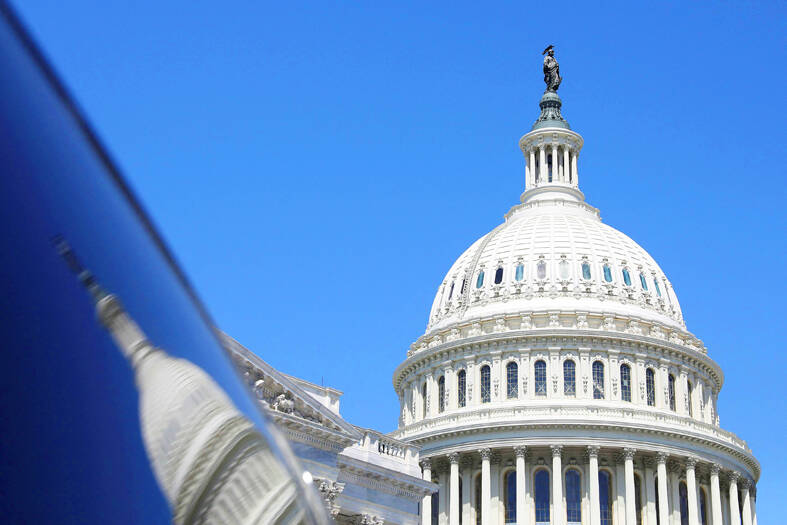US representatives have introduced a bipartisan Taiwan Peace Through Strength Act to promote peace through strength in Taiwan, as well as expedite and prioritize US military sales to the nation.
US representatives Chris Pappas, a Democrat, and Jim Banks, a Republican, on Friday last week proposed the House’s version of the bill, following the US Senate’s version proposed by US Senator Marco Rubio on June 14.
The bill proposes “to reinforce our nation’s support of Taiwan as the island faces the increased threat of a Chinese Communist Party military attack,” a press release issued by Pappas’ office said.

Photo: Reuters
“This legislation would prioritize Taiwan’s resiliency in the face of potential conflicts and expedite the delivery of much-needed resources to ensure they have the capability to defend themselves effectively,” Pappas was quoted as saying.
Chinese President Xi Jinping’s (習近平) “extreme rhetoric makes it clear that lawmakers in Washington must act now to deter a Chinese invasion,” Banks said.
“Make no mistake: deterring an invasion of Taiwan must be our top priority,” Rubio said.
While the text of the proposed bill is not yet available, it would expedite and prioritize US military sales to Taiwan; establish regular combined US-Taiwan exercises, training and professional exchanges; and establish a Taiwan Critical Munitions Acquisition Fund, the press release said.
The proposed bill also clarifies that US authorities would arm Taiwan as per the Taiwan Relations Act, it added.
The US Senate’s version of the act makes amendments to the Taiwan Relations Act, allowing the US to provide “arms conducive to the deterrence of acts of aggression by the People’s Liberation Army” to Taiwan, not just “arms of a defensive character.”
The US would provide Taiwan with defense articles and defense services that allow Taiwan to “implement a strategy to deter acts of aggression by the People’s Liberation Army and to deny an invasion of Taiwan by the People’s Liberation Army,” instead of maintaining “a sufficient self-defense capability,” the proposed bill says.
The Senate’s version preclears and prioritizes military platforms, technologies, and equipment for sale and release to Taiwan through the Foreign Military Sales program.
Contractors awarded US Department of Defense contracts to provide items for such sales to Taiwan are required to expedite and prioritize the production of the items regardless of the order in which contracts were signed, the proposed bill says.
These contractors are forbidden from conducting any business in China, or with any entity that is owned by or controlled by the Chinese government or the Chinese Communist Party, or any subsidiary of such a company, it says.
The US secretary of defense should establish a high-level military planning mechanism between the US and Taiwan to oversee a joint exercise program, and coordinate military education and training exchanges, it says.
The mechanism aims to coordinate the capabilities of military forces in the US and Taiwan “to address the needs of currently anticipated and future contingencies,” it says.
The US government is required to transfer up to US$2 billion a year to the Taiwan Critical Munitions Acquisition Fund to ensure that the US’ allies and partners have adequate stocks of critical munitions in advance of a potential operation to defend Taiwan, it says.

Taiwan is gearing up to celebrate the New Year at events across the country, headlined by the annual countdown and Taipei 101 fireworks display at midnight. Many of the events are to be livesteamed online. See below for lineups and links: Taipei Taipei’s New Year’s Party 2026 is to begin at 7pm and run until 1am, with the theme “Sailing to the Future.” South Korean girl group KARA is headlining the concert at Taipei City Hall Plaza, with additional performances by Amber An (安心亞), Nick Chou (周湯豪), hip-hop trio Nine One One (玖壹壹), Bii (畢書盡), girl group Genblue (幻藍小熊) and more. The festivities are to

Auckland rang in 2026 with a downtown fireworks display launched from New Zealand’s tallest structure, Sky Tower, making it the first major city to greet the new year at a celebration dampened by rain, while crowds in Taipei braved the elements to watch Taipei 101’s display. South Pacific countries are the first to bid farewell to 2025. Clocks struck midnight in Auckland, with a population of 1.7 million, 18 hours before the famous ball was to drop in New York’s Times Square. The five-minute display involved 3,500 fireworks launched from the 240m Sky Tower. Smaller community events were canceled across New Zealand’s

‘IRRESPONSIBLE’: Beijing’s constant disruption of the ‘status quo’ in the Taiwan Strait has damaged peace, stability and security in the Indo-Pacific region, MOFA said The Presidential Office yesterday condemned China’s launch of another military drill around Taiwan, saying such actions are a “unilateral provocation” that destabilizes regional peace and stability. China should immediately stop the irresponsible and provocative actions, Presidential Office spokeswoman Karen Kuo (郭雅慧) said, after the Chinese People’s Liberation Army (PLA) yesterday announced the start of a new round of joint exercises around Taiwan by the army, navy and air force, which it said were approaching “from different directions.” Code-named “Justice Mission 2025,” the exercises would be conducted in the Taiwan Strait and in areas north, southwest, southeast and east of Taiwan

UNDER WAY: The contract for advanced sensor systems would be fulfilled in Florida, and is expected to be completed by June 2031, the Pentagon said Lockheed Martin has been given a contract involving foreign military sales to Taiwan to meet what Washington calls “an urgent operational need” of Taiwan’s air force, the Pentagon said on Wednesday. The contract has a ceiling value of US$328.5 million, with US$157.3 million in foreign military sales funds obligated at the time of award, the Pentagon said in a statement. “This contract provides for the procurement and delivery of 55 Infrared Search and Track Legion Enhanced Sensor Pods, processors, pod containers and processor containers required to meet the urgent operational need of the Taiwan air force,” it said. The contract’s work would be